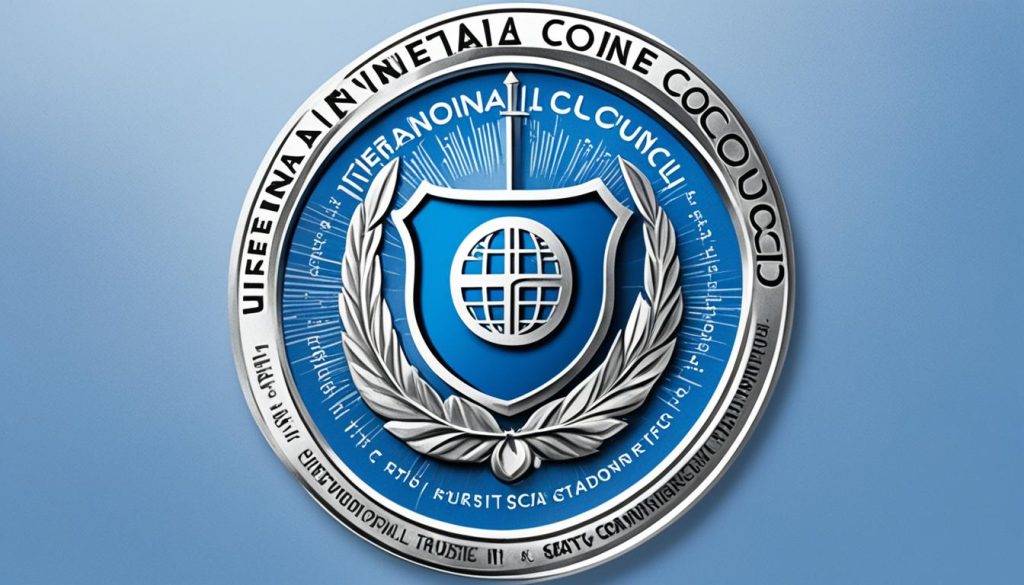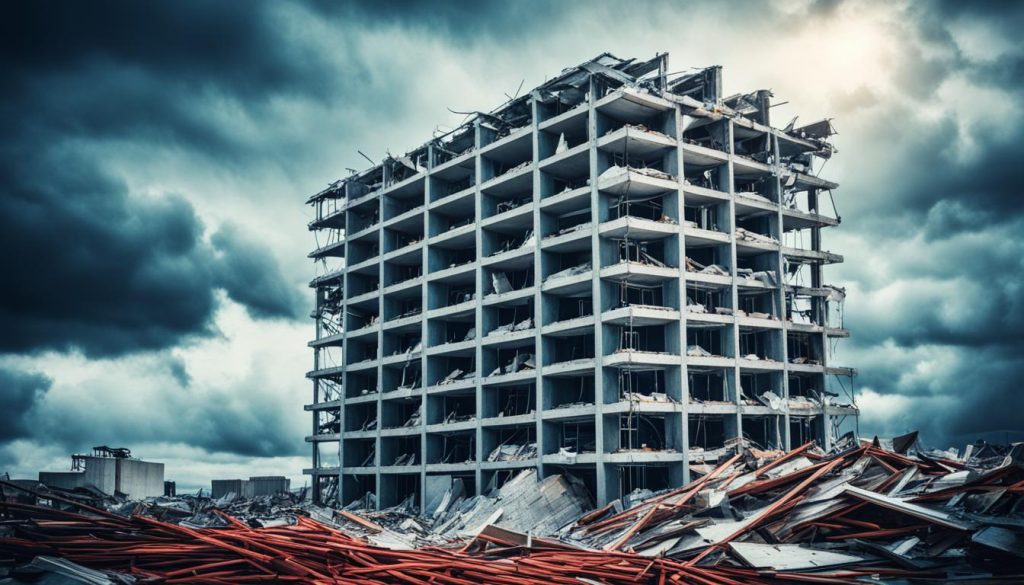International Code Council: Leading Safety Standards
The International Code Council (ICC) is a globally recognized organization at the forefront of setting safety standards in the construction industry. With a focus on building safety and regulations, the ICC plays a pivotal role in ensuring that structures are constructed and maintained in accordance with the highest safety standards.
The ICC, often referred to as the ICC, goes beyond merely establishing guidelines; it works diligently to develop internationally recognized building regulations that promote safety and sustainability. These regulations provide a framework for architects, engineers, contractors, and other construction professionals to follow, ensuring the well-being of occupants and safeguarding properties.

Key Takeaways:
- The International Code Council (ICC) sets safety standards for the construction industry.
- Building safety and regulations are the primary focus of the ICC.
- The ICC develops internationally recognized building regulations.
- These regulations promote safety, sustainability, and occupant well-being.
- The ICC ensures that structures adhere to the highest safety standards.
Importance of Building Codes and Compliance
When it comes to constructing safe and durable structures, building codes and code compliance play a crucial role. Building codes are a set of regulations and guidelines that dictate the minimum standards for construction practices. They cover various aspects such as structural integrity, fire safety, electrical wiring, plumbing systems, and more.
Building codes are developed to ensure the safety and well-being of occupants, as well as the longevity of the structure itself. By adhering to these codes, builders and contractors can create buildings that are structurally sound, resistant to fire hazards, and built with proper electrical and plumbing systems.
Code compliance refers to the process of ensuring that construction projects meet the requirements set forth by building codes. It involves thorough inspections, certifications, and adherence to specific standards. Code compliance helps to eliminate potential risks and hazards, safeguarding the lives of occupants and reducing the likelihood of accidents or structural failures.
The International Code Council (ICC) plays a significant role in the development of construction standards and promoting code compliance worldwide. The ICC works collaboratively with experts from various disciplines, including engineers, architects, and building officials, to create and update building codes that reflect the latest industry advancements and best practices.
Through its comprehensive approach to construction standards, the ICC ensures that buildings meet the highest level of safety and integrity. By setting these standards, the ICC fosters uniformity in regulations across jurisdictions, simplifying the compliance process for builders and enabling efficient construction practices worldwide.
The Role of Building Codes and Compliance in Safety
Building codes and code compliance are essential for ensuring the safety of both occupants and construction professionals. They provide a framework that addresses potential risks and hazards associated with various aspects of construction, including structural design, fire prevention, accessibility, and environmental sustainability.
By enforcing strict adherence to building codes, authorities can mitigate the risk of accidents and minimize the potential damage caused by natural disasters or emergencies. This helps to protect lives and property while providing peace of mind for building occupants.
Table: Benefits of Building Codes and Code Compliance
| Benefits | Description |
|---|---|
| Enhanced Safety | Building codes ensure that structures are designed and constructed to withstand various hazards, promoting the safety of occupants. |
| Structural Integrity | Adhering to building codes helps to ensure that structures are built with sound engineering principles, preventing failures and collapses. |
| Fire Prevention | Building codes include fire safety measures to minimize the risk of fires and provide sufficient time for evacuation in case of emergencies. |
| Health and Accessibility | Codes address health-related aspects, such as ventilation and sanitation, and promote accessibility for individuals with disabilities. |
| Long-Term Durability | Building codes focus on quality construction practices, ensuring that structures can withstand the test of time and natural elements. |
By following building codes and ensuring code compliance, construction professionals contribute to the overall safety and well-being of society. They play their part in creating structures that are resilient, efficient, and suitable for their intended purpose.

The ICC’s Contributions to Building Safety
In its mission to prioritize building safety, the International Code Council (ICC) plays a critical role by collaborating with experts to develop fire codes and other safety regulations. Through its efforts, the ICC promotes the highest standards of building safety to protect lives and property.
Collaborative Approach to Fire Codes
The ICC works closely with fire protection professionals, engineers, architects, and other stakeholders to develop comprehensive fire codes. These codes outline essential requirements for fire prevention, detection, suppression, and evacuation in various types of buildings.
Advancing Research and Technology
Recognizing the importance of staying at the forefront of building safety practices, the ICC invests in research and technology to enhance industry standards. This commitment ensures that the latest advancements in fire detection systems, building materials, and emergency response protocols are incorporated into the codes and regulations.

Training and Education Initiatives
The ICC also places significant emphasis on training and education programs to disseminate knowledge about building safety. By offering workshops, seminars, and certifications, the organization equips professionals with the necessary expertise to ensure compliance with fire codes and other critical safety regulations.
Global Impact and Collaboration
Driven by its vision for safer buildings worldwide, the ICC collaborates with international organizations to harmonize building codes and share best practices. This global approach fosters consistency in building safety standards and facilitates cooperation among nations to address common challenges.
| Contributions | Benefits |
|---|---|
| 1. Development of fire codes | – Ensures standardized safety measures – Provides guidelines for fire prevention and suppression |
| 2. Advancement in research and technology | – Incorporates cutting-edge safety practices – Enhances building resilience and protection |
| 3. Training and education initiatives | – Enables professionals to enforce safety regulations – Enhances overall competence in building safety |
| 4. Global impact and collaboration | – Promotes consistent safety standards across borders – Encourages information exchange and knowledge sharing |
Conclusion
In conclusion, the International Code Council (ICC) plays a critical role in the construction industry by setting and enforcing building regulations and construction standards. The ICC’s commitment to building safety ensures that structures are constructed and maintained in accordance with the highest safety standards, promoting the well-being of occupants and safeguarding communities.
Adhering to building regulations is of utmost importance as it helps protect against potential hazards and ensures the structural integrity of buildings. The ICC’s comprehensive set of building codes provide guidelines for construction practices, addressing areas such as fire safety, structural design, energy efficiency, and more.
With their global impact, the ICC’s construction standards establish a uniform framework that countries and jurisdictions can adopt, creating a harmonized approach to building safety across borders. By collaborating with experts and leveraging the latest research and technology, the ICC continues to advance the field of building safety.
FAQ
What is the International Code Council (ICC)?
The International Code Council (ICC) is a non-profit organization that develops and publishes model building codes, which serve as the basis for building regulations in many jurisdictions. The ICC is dedicated to ensuring the safety and sustainability of the built environment.
Why are building codes and code compliance important?
Building codes provide essential guidelines for construction practices, ensuring that structures are built to withstand various hazards and meet safety standards. Code compliance is crucial to ensure that buildings are safe, structurally sound, and meet the requirements set forth in the codes.
How does the ICC contribute to building safety?
The ICC plays a vital role in building safety. It develops and maintains a set of comprehensive international building codes, including fire codes, electrical codes, and plumbing codes, among others. These codes are regularly updated to incorporate advancements in technology and safety practices.
Are ICC codes recognized worldwide?
Yes, ICC codes are widely recognized and adopted globally. Although the specific codes may vary from country to country, the principles and concepts behind ICC codes are often applied worldwide to ensure consistent and reliable building standards.
How does the ICC stay up-to-date with evolving safety practices?
The ICC constantly collaborates with experts, industry professionals, and regulatory agencies to gather insights and feedback regarding emerging safety practices. This helps the organization stay current with evolving technologies, research, and best practices in the construction industry.
Can the ICC assist in ensuring code compliance?
Yes, the ICC offers various resources and tools to assist in achieving code compliance. These include training programs, seminars, and publications that provide guidance on interpretation and implementation of the codes. Additionally, the ICC offers certifications to professionals who specialize in code compliance and enforcement.